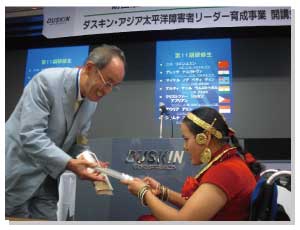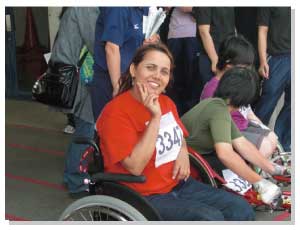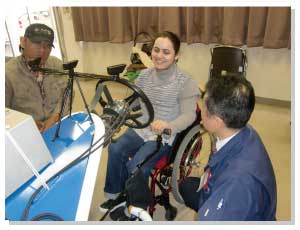- HOME
- Alumni News
- Jamuna Subedi (11th trainee)
- Jamna's Final Report
Jamna's Final Report
Looking back on the past 10 months
In Nepal, I had some opportunities to learn about disability and human rights of persons with disabilities. It was through working for a variety of organizations, reading books and participating in conferences. However in Japan, I learned about these issues at hand, walking in streets with obstacles and barriers and experiencing universally designed bathrooms, buildings and trains.

Studying Japanese
For the first three months of the training, I stayed at the lovely, barrier-free Toyama Sunrise to study Japanese. Before I arrived in Japan I only knew hiragana. At first I could not understand Japanese at all. But the teachers gave us lessons in a way that was so interesting, and also easy to follow, that I could soon speak basic Japanese. And because of that, I began to go to all kinds of places by train, by myself. I met many people and made many friends.
Home-stay program
All of the trainees stayed at the homes of Japanese people over the New Year, to get in touch with the Japanese culture and lifestyle. My destination was Kochi Prefecture. I stayed at the home of Ms Higuchi and Mr Kondo. They gave me such a warm welcome. They taught me about the culture of Kochi, and kindly took me to many places of interest. We also went to the Sakamoto Ryoma Memorial Museum. Sakamoto was one of the greatest leaders at the end of the Edo era, leading the feudalistic samurai government to a democratic society. I was very impressed by the stories of his leadership. When I think of this home stay experience there is something I will always remember. It is peer counseling that I received with Ms Higuchi. It was the first time that I recognized the importance of peer counseling.
Individual training
1. Center for Independent Living “Higashiyamato”
My first individual training was at Center for Independent Living “Higashiyamato”. I went through approximately two weeks of training with three young and energetic female leaders, while staying at their home.
My mother passed away when I was a child, so I do not know the warmth of a mother. But when I met Ms Tabuchi and got to know her warm heart, I wished I had a mother. I still call Ms Tabuchi “mama”.
The first time I met Ms Ebihara (“Ebi-chan”), I was shocked. I had never seen anyone with muscular dystrophy in Nepal. I began to have a much better understanding of muscular dystrophy after talking with Ebi-chan, Kei-chan and Kobinata-kun. I then went to TIL Ventilator Network Co-Net with Ebi-chan. As I listened to the stories of friends with muscular dystrophy, I wondered how and where people in Nepal with dystrophy lived. As I watched the independent lifestyle of the three female leaders day in, day out, I began to understand, little by little, that it is possible for people to live independently despite severe disabilities.
2. Center for Independent Living “Iruka Okinawa”
From the end of January to the end of February, I stayed at Center for Independent Living “Iruka Okinawa”, in Okinawa for my training. At first I was too shy to say anything because I could not understand Japanese very much. However as Kenjiro and others helped me out with gestures and sign language, I began to slowly enjoy conversation. While I was there, the staff at Iruka and The North Center for Independent Living Kirara was having negotiations with a variety of organizations to enact a disability discrimination act for Okinawa. I accompanied Suzuko-san to visit these organizations to learn how to engage oneself in negotiation processes. I also learned about the importance of working together as a team with a shared purpose. As I studied the United Nations’ Convention on the Rights of Persons with Disabilities, I began to understand the difference between direct and indirect discrimination, and the concept of reasonable accommodation; and how to act towards advocacy.
Another thing I learned at Iruka was the concept of independent living. I myself did not resort to a personal aid, but I could understand how friends with severe disabilities lived independently with personal aids.
3. Mainstream Association
While still in Nepal, I was really looking forward to visiting Mainstream Association, as I have heard a lot about them from my predecessors Krishna and Deepak. My anticipation was amplified when I listened to Mr Kadota’s speech in January. When I arrived at Mainstream Association for the first time, 30 members of staff came over to Nishinomiya Station to greet me, singing a song from Nepal. I was stunned and touched. Everyone was so kind to me, I had no trouble during the training period.
At Mainstream, life comprised seriousness, such as learning about aiding persons with disabilities, peer support, and independent living programs—and also, and more importantly for me, I learned about the importance of playing. We did a lot of things together-- going bowling, visiting Universal Studio and talking until late every night. I felt powered up, and hugely changed. The friends at Mainstream are true samurais, samurais who fight to change society. As I listened to their determination towards disability movement, I promised them that I too would continue to fight for disability movement until the day I die.
4. Uchina TRY
I heard about TRY for the first time at Mainstream Association. I heard that TRY would be held in May to enact disability rights act in Okinawa, and immediately wanted to participate. I consulted with Nasu san and Masako san numerous times, and thankfully, they gave me an approval to participate in TRY. I had always thought that Japan was a barrier-free country with no discrimination. But when we walked in the streets of Okinawa, there were many barriers and obstacles, and also a lot of people who stared at us, or showed obvious abomination. It was the first experience for me to know that Japan too had many things that needed to be worked on, and it helped me understand the meaning and importance of people with disabilities getting together to change society. We walked day after day, be it rain or shine. I felt more confident about getting engaged in disability activities. I felt energized.
Experiencing sport
In Nepal, I had never participated in any sport event. In Japan, for the first time in my life, I participated in a marathon event: Nagoya City Handy Marathon. I also experienced swimming and skiing, and understood how fun and important it is, to do sport. During the ski training, I just wanted to ski more and more, as I touched snow or skied down from heights. Nepal is the country of the Himalayas- we have snow and mountains, but I had never heard of people with disabilities ski in Nepal.

Group training
In June, the seven of us trainees got together again for the group training. I felt a great sense of happiness as we exchanged stories about our experience in Japan, and also about our future goals. We now have dreams and plans for the future. Everyone’s dream was different, but we had a common thread, to make a society where people with disabilities can live happily. Our dreams will come true, as long as we keep trying and remain confident.

My goals
The experience at the independent centers made me wish to create a society where the human rights of every single person with severe disabilities can be given enough consideration. I will work on peer counseling and independent living movement, to bring my experience and findings in Japan into practice in Nepal. I would like to negotiate with the government in Nepal to create a truly barrier-free country. I would also like to consult with my predecessors Krishna and Deepak to evaluate what we can do to change the society of Nepal. I will try my best until independent living movement prevails in Nepal.
Lastly
My heartfelt thanks go to everyone in Japan to whom I owe so much. I am also extremely grateful, to everyone at the Duskin AINOWA Foundation and Japanese Society for Rehabilitation of Persons with Disabilities. Thank you so much.




